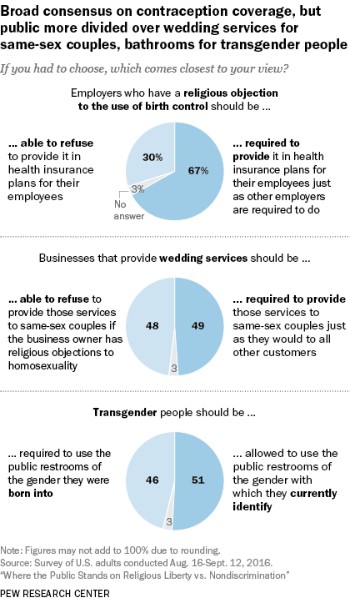
Nashville—A Pew Research Center report suggesting deep division between Americans who support religious liberty and those who support so-called sexual liberty has drawn critique for its framing of issues related to contraception, same-sex marriage and transgenderism.
At the same time, the report has drawn praise as generally reflective of the cultural moment.
A survey released Sept. 28 found 67 percent of the 4,538 Americans polled said employers with religious objections to contraception should nonetheless be required to provide it in their employee health insurance plans. Approximately half (49 percent) of those surveyed said wedding-related businesses should be required to provide services to same-sex couples even if the business owners possess religious objections. A similar percentage (51 percent) said transgender individuals should be allowed to use restrooms corresponding with their so-called gender identity.
Bill Donohue, a sociologist who serves as president of the Catholic League, said Pew’s data indicates less support for religious liberty than some other surveys because “the wording of the question strongly influences the respondent’s answer.”
Pew asked respondents to choose between upholding religious liberty and requiring equal treatment in various scenarios, according to the report. In contrast, Donohue cited a December study by the Associated Press and the independent research organization NORC that merely asked whether respondents supported religious liberty. The latter survey found 82 percent support of religious liberty protections for Christians.
“When Americans are asked about their support for religious liberty in general — when there is no competing value they are asked to weigh—their commitment shines through,” Donohue said in a news release. “But in the real world, there is usually a conflict between rights.”
Donohue added, “Americans prize religious liberty but they also support equal treatment. When those values conflict, much depends on whether the respondent is being asked to defend government coercion or support equal treatment: the former is not popular, but the latter is.”
Among Pew’s findings about specific religious groups:
n A majority (53 percent) of white evangelical Protestants said employers with religious objections should be allowed to refuse to provide contraception coverage. Some 32 percent of Catholics, 23 percent of black Protestants and 15 percent of religiously unaffiliated individuals agreed.
n A full 77 percent of white evangelical Protestants said businesses should be allowed to refuse provision of wedding services to same-sex couples based on religious objections. Forty-eight percent of black Protestants agreed along with 43 percent of Catholics and 33 percent of the religiously unaffiliated.
n Regarding restroom usage, 69 percent of white evangelical Protestants said transgender people should be required to use facilities corresponding to their “birth gender.” Forty-seven percent of black Protestants, 50 percent of Catholics and 28 percent of the religiously unaffiliated agreed.
The Pew report’s statistics regarding Catholics may be misleading, Donohue stated, because Pew did not distinguish between practicing and non-practicing Catholics — a critique that presumably applies to statements about other religious groups as well.
Albert Mohler Jr., president of Southern Baptist Theological Seminary, agreed that the framing of questions can affect the level of support for religious liberty.
“If we put religious liberties up for a popular vote, we will not always be pleased with the result,” Mohler said Sept. 29 on his podcast The Briefing, “because Americans are quite easily persuaded one way or the other by any number of factors, including exactly how this kind of question is even framed.”
The framing of Pew’s question about contraception in particular, Mohler said, could have affected survey results.
“It is claimed that Americans are basically now of one mind in terms of religious liberty on the contraception issues,” Mohler said. “But this avoids a huge problem with the way that’s framed.” In cases like Hobby Lobby’s lawsuit before the U.S. Supreme Court, “the big issue actually wasn’t just contraception, but specific forms of contraception” not mentioned by Pew which have “an abortifacient effect.”
In the end, however, Donohue and Mohler say the survey rightly reflects America’s division regarding religious liberty.
“The greatest insight and affirmation from this research is that the basic divide in this country is theological rather than merely political or even merely moral,” Mohler said. He noted that weekly attendance of religious services increases a person’s likelihood of supporting religious liberty related to contraception and wedding services, according to Pew, and of supporting the restriction of restroom usage based on biology. (BP)
David Roach